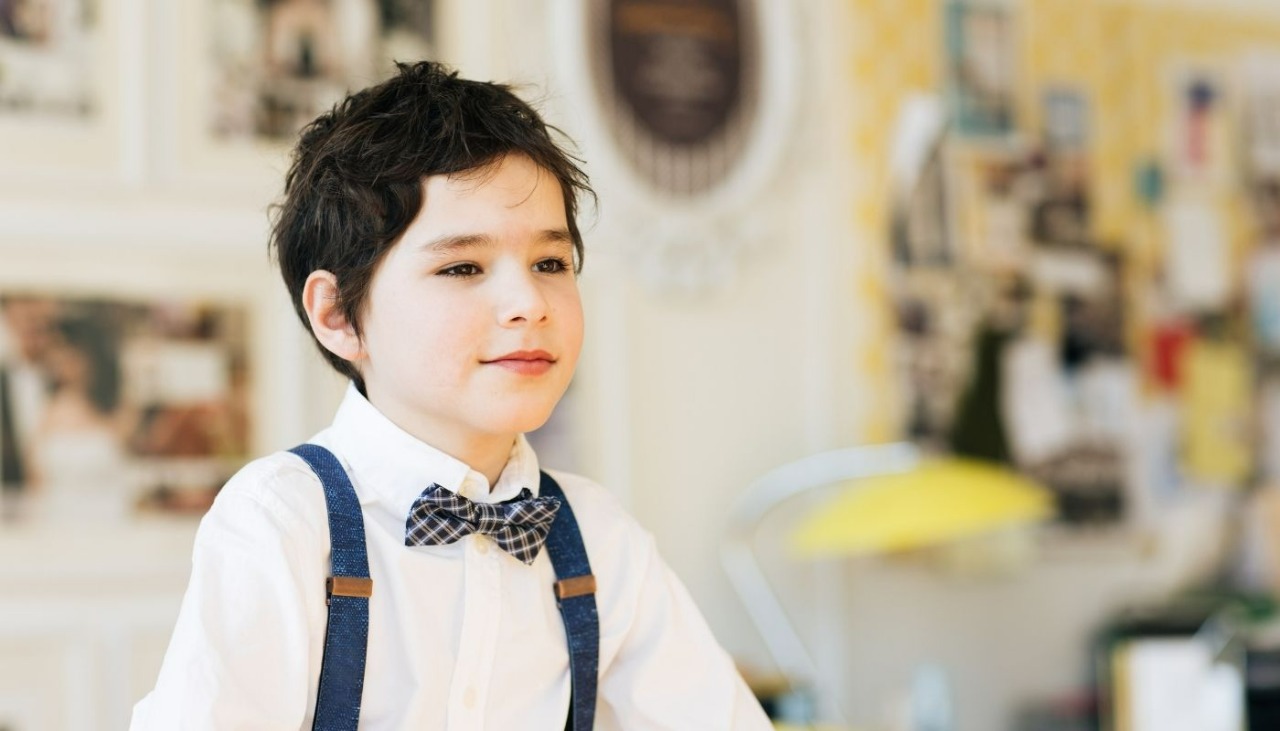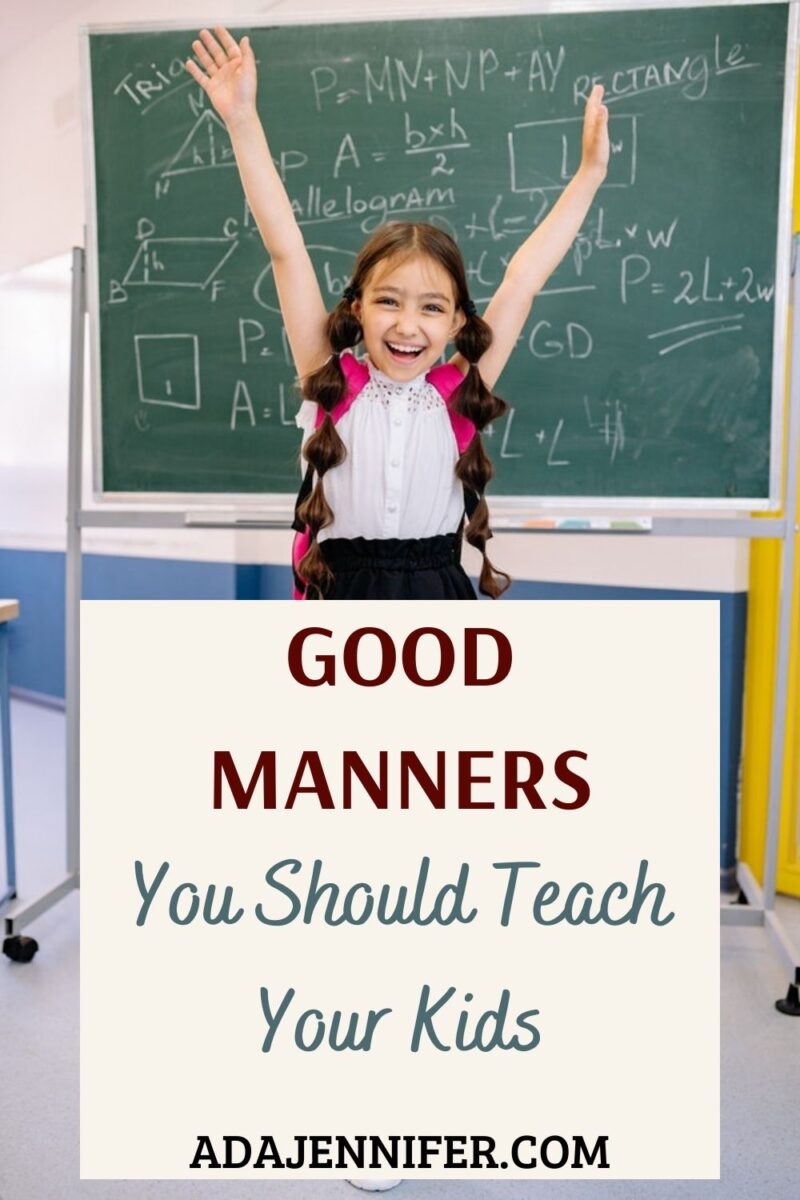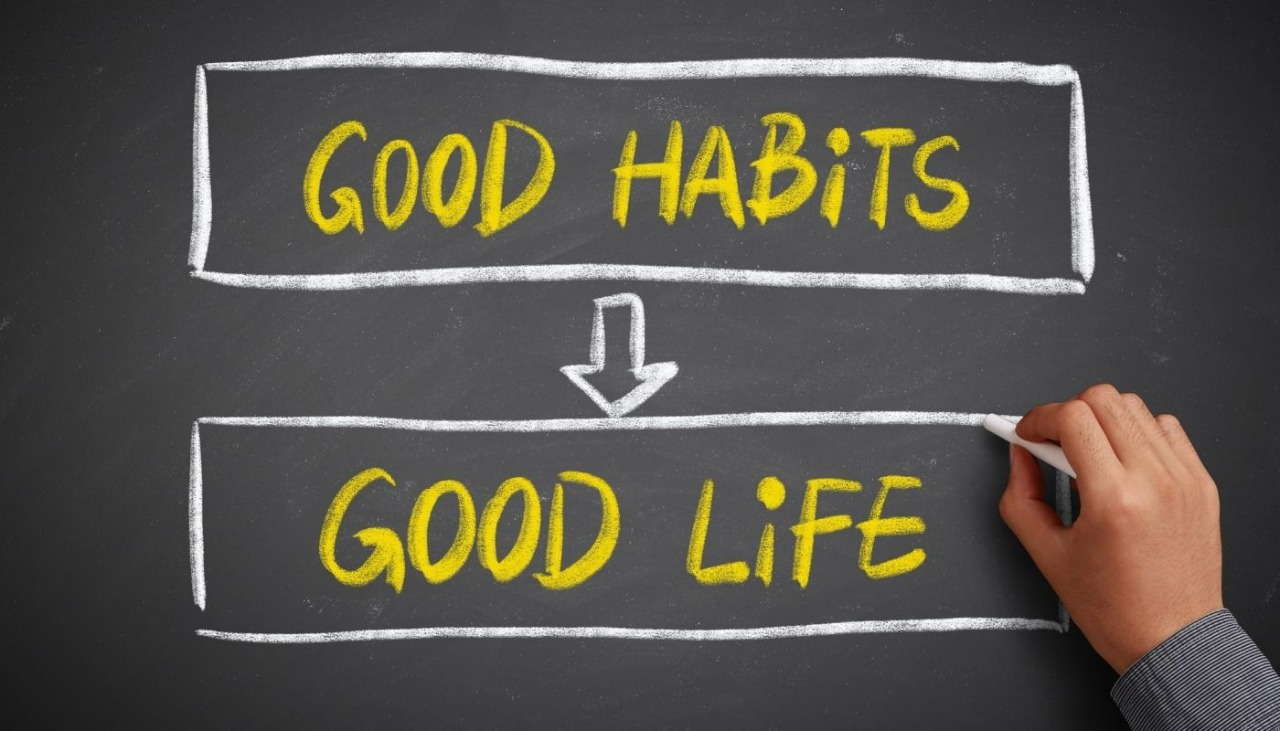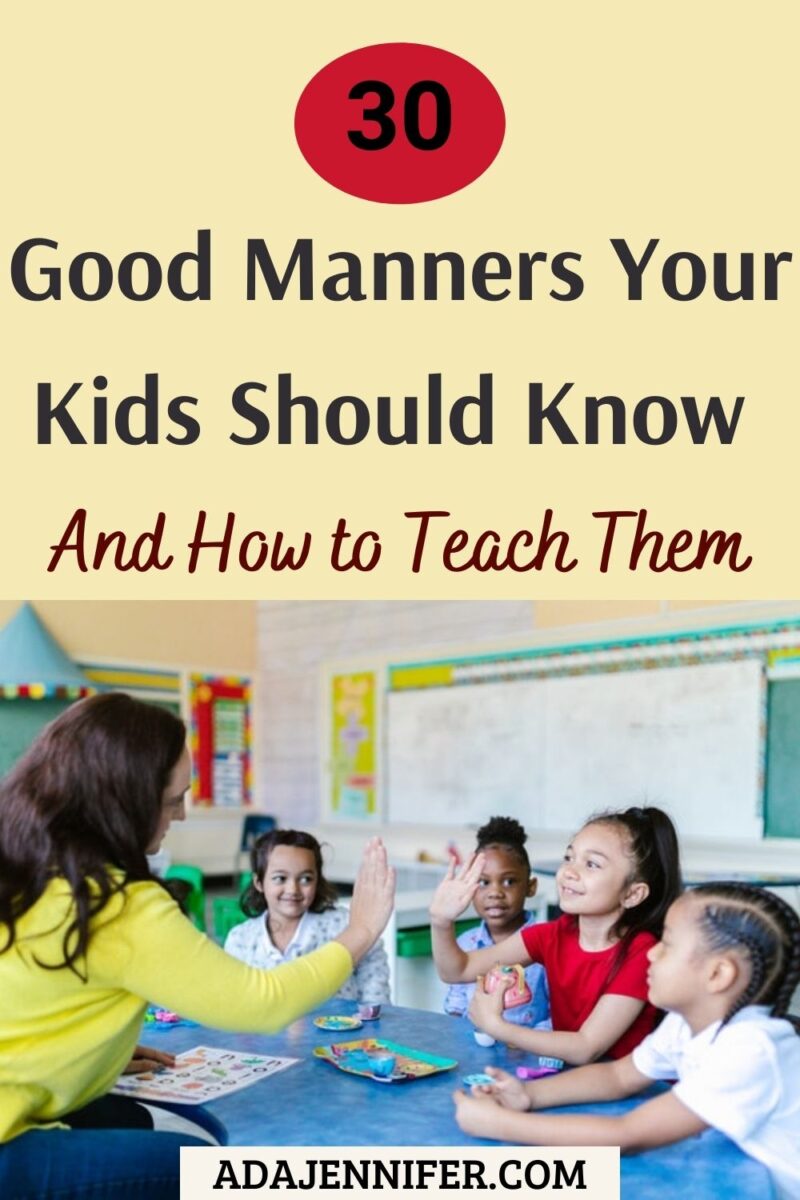30 Good Manners Your Kids Should Know And How To Teach Them

Kids are notorious for their mischief, but that’s what makes them innocent and cute. Teaching good manners and respect to your children doesn’t mean there’s a need to change them or make them disciplined overnight. Good manners are learning how to express yourself with the utmost respect, politeness, and proper conduct.
Children are born with curiosity, allowing them to ask the silliest questions, which are also witty from their perspective. Therefore, continuously forcing good manners and frowning upon bad manners won’t help. The key is to make their curious minds understand the need and importance of good manners first and then find creative ways to teach the same.
Importance Of Good Manners
The importance of good manners is known to us as adults, but here’s why it’s crucial for your child as well.
- Polite behavior is a way of life, not just something to be pulled out at a wedding or a fancy restaurant. If learned early, good manners come naturally and give a child confidence in knowing what to do in different situations.
- Good manners help to build healthy social relationships in schools, colleges, and in life. They help children to be better able to interact in various social groups.
- When we use good manners, we feel better about ourselves, and we earn others’ respect. Similarly, when kids interact with people respectfully, the interaction encourages reciprocity. In turn, they also get to experience the same behavior towards themselves. We all like to be with people who are considerate, kind, and confident.
- Good manners make life smooth and enjoyable. It keeps you morally in charge of yourself and your surroundings.
- Being polite towards others by showing courtesy or kindness can help build genuine connections and leave a mark in people’s lives. Having good manners communicates to others that we respect them and consider their feelings.
- The right conduct is crucial for success and building a charismatic personality. Children with good manners also gain more opportunities in school and real life because they stand out from others.
Mannerisms shape your personality, making both your first and last impressions in the world appealing. Children who have good manners experience many benefits in life. They are also more confident in their ability to express themselves and attract opportunities. Now that you know the importance of good manners, here are a few simple yet significant-good manners that your child can learn and practice.

10 Basic Good Manners For Right Conduct

Parents and teachers must preach and teach good manners to kids for their daily life. Here are ten basic good manners that kids can practice every day are:
- Say “sorry” when you feel apologetic.
- Say “please” to be respectful.
- Say “thank you” when you are appreciative.
- Say “excuse me” to get attention politely.
- Ask “May I?” to ask for permission politely
- Greetings—“Hello,” “Goodbye”
- Wishes—”Good night,” ” Good afternoon,” “Good morning.”
- Ask, “How are you?” to politely question someone’s well-being.
- Introduce yourself to new people.
- Make eye contact to show confidence.
Exercising these good manners and following them throughout the day can bring sunshine smiles to your kids’ faces and that of others around them. Once learned, good manners and positive etiquettes stay with you forever. Overall they’re not just supposed to be one of your qualities but a regular habit.
It is essential to internalize these basic good manners in children, especially during preschool, because their level of understanding builds at this tender age.
List Of Good Manners For Kids
Although the above mentioned are basic etiquettes and a part of our daily dialogue, they are not enough. Here is a list of several other good manners that a child must develop to evolve.
- Cover Your Mouth When You Sneeze, Cough, And Yawn—Opening your mouth wide open in public can expose others to germs.
- Do Not Pick Your Nose In Public—It is unhygienic and gross.
- Knock The Door Before Entering A Room—Especially when someone’s changing or is using the bathroom.
- Avoid Talking Or Using Phones At The Dinner Table—Making conversation and learning new things is always more pleasant than using the same phone apps all day. If you can’t talk for some reason, greeting and respecting people’s presence by eye contact or a smile can show you are grateful for their company.
- Sitting Quietly And Applauding At The End Of Plays, Movies, And Musical Performances—The performance may or may not interest you, but simply appreciating art and culture by applauding can make people’s efforts feel appreciated.
- Wash Your Hands Before And After Eating A Meal And After The Washroom—It is vital for a well sanitized, healthy, and clean environment.
- Be Gentle Towards Animals—Treat animals with love and care, and stop any cruelty against stray animals if you see it happening. Feed stray dogs, pigeons, cats, and love all animals. After all, we are all beings living together on the same planet.
- Hold The Door For Others And Pull The Chair—Be kind towards others, even strangers. They may not need you to hold the door or pull the chair for them, but it is considered polite.
- Offer To Help Someone If They Need It—especially the old, the poor, the young. If you see someone older than you standing, offer your seat. Give food or an umbrella to the poor. Be human, show humanity.
- Shake Hands, Or Ask If You Can Hug—A handshake or a hug can be friendly and sometimes comforting, but always ask for consent before touching someone is crucial.
Building a solid base of good manners from the very start will also enable your child to make virtuously ethical decisions in the future. The list of ethical manners, just like children, keeps evolving with time and place, but the rule of kindness persists at all times. Similarly, there are different sets of manners that kids should follow in school and at home.
10 Good Manners For School
School days are the most memorable and fun days for children. They also play a significant role in building a child’s personality. Since it plays such a big role, it needs to be respected and guided by etiquette and good manners.
1. Ask For Permission
Always ask for your teacher’s permission before entering the classroom, using the washroom, and while leaving, say goodbye. Respecting your mentors is as important as respecting your education.
2. Returning Items After Borrowing Them
Be careful and aware of others’ belongings, especially money. Also, politely stand up for yourself when you need to ask for your belongings back.
3. Be Appreciative Of Others
One compliment goes a long way in lighting up someone’s day. Be loving and shower genuine compliments on your friends for their achievements or good grades.
4. Complete Your Homework And Pay Attention In Class
Complete your assignments on time and focus in class while your teacher is talking.
5. Do Not Get Into Physical Fights
Resorting to violence is hateful and harmful. Express your discomfort by a formal complaint rather than a punch.
6. Do Not Make Rude Comments About Anyone’s Apperance, Race, Gender And Caste
Passing personal comments on someone’s physical appearance is judging them with a shallow mind. It is hurtful, and it blocks your perspective to see beyond biases and prejudices.
7. Do Not Litter
Littering at places is disrespectful and insulting to the environment you’re in. Always find a dustbin and do not litter the grounds.
8. Normalize Being Vulnerable And Empathetic
Do not judge or make fun of yourself or your friends for being upset or angry. They are common emotions. If anything, try and be a good listener and empathize if you can.
9. Sharing Is Caring
If you love and care for someone, share your things with them and multiply happiness. Then be it emotions, chocolates or flowers. Good manners are all about small acts of decency, compassion, humility, and modesty. Now that we know the dos, let’s discuss the don’ts, i.e., bad manners.
10. Follow The Rules And Regulations

A school is an institution of knowledge, and the limitations set on you are to teach you discipline.
5 Things That Are Considered As Bad Manners For Kids
Apart from the psychologically rooted behaviors and conditioning that can cause disturbing reactions, a few habits are simply not corrected or taught to kids. Examples of which are as follows:
- Lacking Basic Etiquettes
Not greeting, thanking, or apologizing is considered rude and mannerless. It also shows an absence of respect for others, leading to an anti-social approach.
- Lacking Table Manners
Table manners and food etiquettes describe a child’s background. Lacking appropriate table manners can make a child very messy and unclean.
- Screaming Or Yelling
Screaming and yelling at every small or big inconvenience can cause a short temper in the long run. It can also be bothersome, annoying, and embarrassing.
- Using Foul Language
The use of foul language is uncultured and uncalled for. The words you use describe your character. It doesn’t just include the use of cuss words but also making inappropriate jokes on your peers, putting someone down, or bad-mouthing. Letting these habits grow can turn out to be toxic in their growing years.
- Interrupting Conversations
A child only starts interrupting conversations to gain your attention or be at the center of a group at all times. The need to be heard can cause them to do so. Cutting off others in between is also a sign of impatience and poor self-confidence.
Bad habits are red flags that cause hindrance to growth in the future. Parents should not ignore these, waiting for them to fade away with time. Sitting down to have candid conversations with your child can help them feel lighter and better. It also develops a sense of trust and understanding. Politely asking and understanding your kid’s problems can help eliminate these bad habits over time.
Do not shy away from taking professional help in any case. Children, parents, and teenagers all equally deserve counseling or therapy.
How To Teach Your Child Good Manners And Respect?
We would all love for others to describe us as “patient,” but patience is a virtue that doesn’t come easily for most of us.
Teaching good manners doesn’t have to be a challenging task for parents and children. Respect and manners are all born from love. You can teach these good manners to your kids with fun family games over chocolate milkshakes at home.
Teaching Manners To Preschoolers
Explaining mannerisms to a preschooler can be difficult, but playing games and tricks with them isn’t. For preschoolers, it’s necessary to develop habits first and then go about their meaning and values. Thanking and apologizing aren’t just words; they are a part of actions that make you. Try incorporating these ideas as you encounter different opportunities with kids during your day to day life:
1. Encouragement
Praise and encourage your child every time they do or say something kind and respectful. This positive psychology will always push them to do more.
Although, make sure you explain that basic etiquettes are mandatory and should be followed with or without appreciation in the long run.
2. Play Games
Play roleplay games of being at a restaurant or tea party with the dolls. Teach and practice table manners with mini-game hours. Start a family conversation about good manners at your dinner table. Try these conversation starters:
- Tell us about a person you know who has good manners.
- Do you think good manners are important? Why or why not?
- Do you have any “pet peeves” related to bad manners? What are they?
- What about table manners? Do you think they are important?
Ask your children to think of good manners simply as directions for life, just like when you play a game, you need to know the rules. You can also read meaningful stories to your children at bedtime to help them learn good things just by listening to you.
3. Secret Codes
Set up a secret signal that your child can use to speak without interrupting an ongoing conversation. The secret signal could be anything like coming to your side or holding your hand until you finish talking. When you feel your child’s hand, you’ll know that they have something to say. This could be a fun way to stop them from interrupting you and also learning to be patient.
4. Prize Of kindness

Label a jar as “Prize of Kindness,” and drop in candy for every kind gesture your child performs. Motivating them with a gift can also be a great way to teach your kid good manners. Preschoolers might not understand words, but they can quickly perceive what actions can lead them to the candy jar.
5. Thank You Cards
Get old-school and make thank you cards with your children. Urge your child to note down things they’re thankful for this year, like a memory or a toy. Sending out and giving each other thank you cards that stay glued to the fridge can be a great reminder for your kids to practice gratefulness.
What If?
Ask what-if questions to test their instincts. Pose situations with options, including multiple right and wrong reactions. Let the kids choose and score points on the same. When they earn a lot of points, take them on a long drive. This positive reinforcement will work a lot better than negative reinforcement like scaring or beating a child to learn.
Bottom Line
We can make a child say thank you, but we can’t make them feel grateful. We can make them share their toys, but we can’t make them choose generosity. We can make them apologize, but we can’t make them kind. If we want to support kids in developing gratitude, generosity, and kindness, we need to model thanking amply, giving generously, and responding kindly.
We often see reminders about constructing good manners or positive behavior, but how often do we project the same towards others or our kids? Be the superhuman you want your child to become in the future you have imagined for them.




